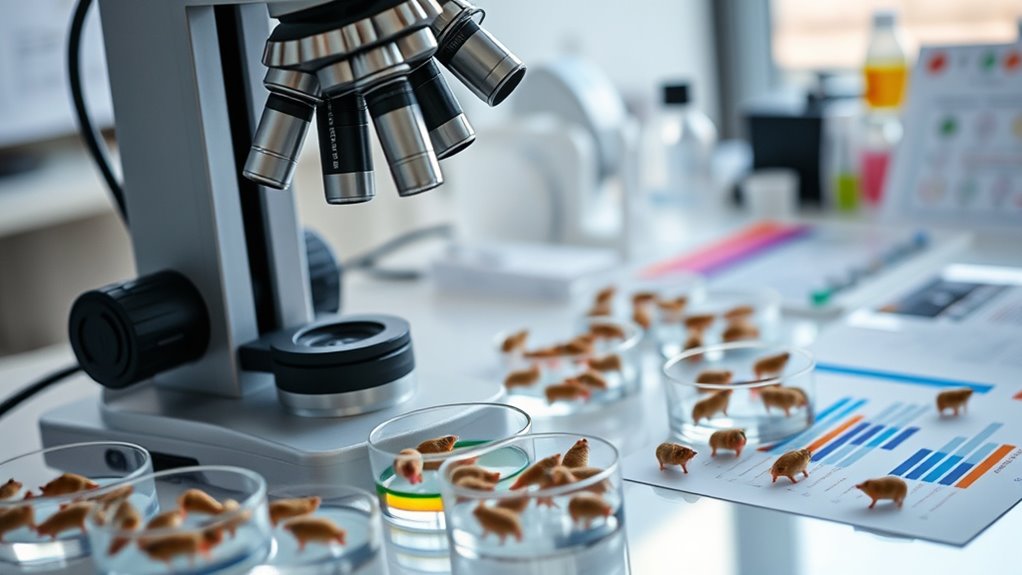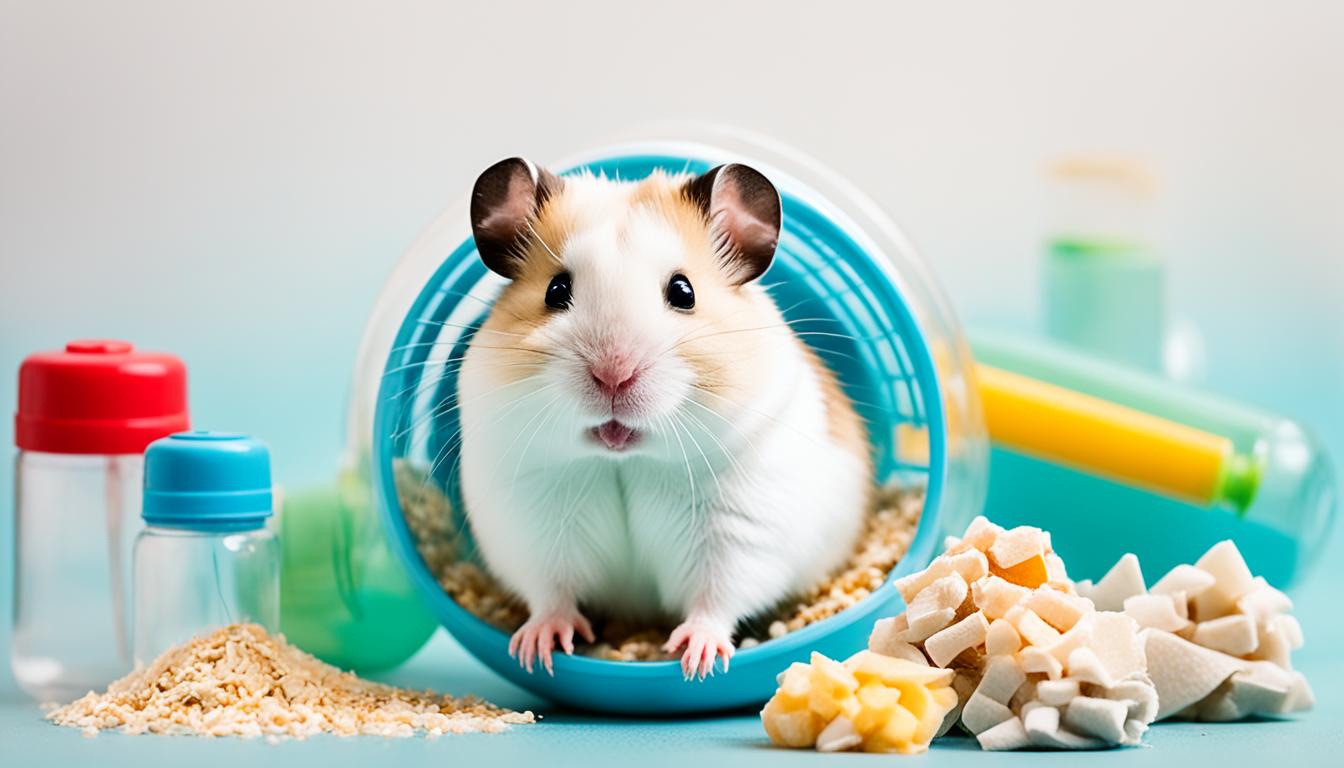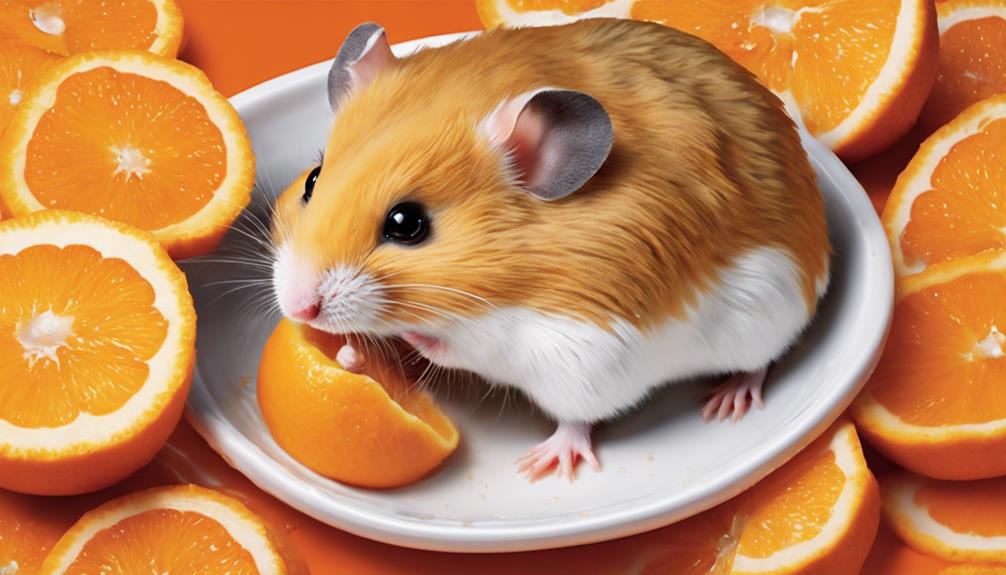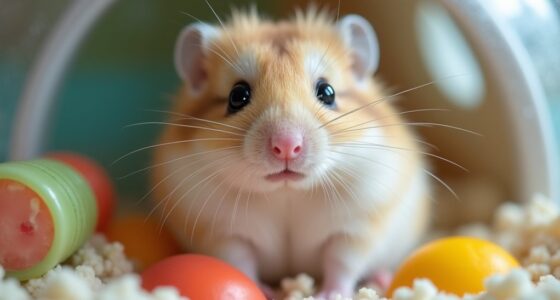Genetic studies on hamsters reveal how mutations can disrupt sleep cycles, causing them to be active during the day and experience irregular sleep patterns. These findings mirror human sleep disorders like advanced or delayed sleep phase syndrome. By understanding the genes involved in circadian rhythms, researchers uncover potential markers and pathways for treatment. If you want to explore how these discoveries could help improve sleep health, there’s more to learn about this fascinating connection.
Key Takeaways
- Hamster genetic mutations reveal how genes influence sleep cycles, providing insights into human sleep disorders.
- Studies identify specific genes linked to circadian rhythm disruptions, aiding in understanding human sleep phase issues.
- Hamsters serve as models for exploring gene-environment interactions affecting sleep health in humans.
- Research findings help develop targeted therapies by uncovering genetic pathways involved in sleep regulation.
- Insights from hamster genetics contribute to personalized approaches for diagnosing and treating human sleep disorders.

Have you ever wondered how genetics influence a hamster’s traits and behaviors? Well, recent research into hamster genetics reveals fascinating insights, especially regarding genetic mutations that affect their sleep cycle. These tiny creatures, often kept as pets, exhibit variations in their sleep patterns that are directly linked to their genetic makeup. When a genetic mutation occurs, it can alter how long a hamster stays awake or asleep, which is surprisingly similar to how certain human sleep disorders develop. By studying these mutations in hamsters, scientists can better understand the genetic factors that regulate sleep in mammals.
Genetic mutations in hamsters reveal key insights into sleep patterns and disorders in mammals.
In hamsters, some genetic mutations lead to a disrupted sleep cycle, causing them to be active during the day instead of at night. This shift in activity patterns mimics human conditions like advanced sleep phase syndrome or delayed sleep phase disorder. When a mutation impacts genes responsible for circadian rhythms—the internal clock that governs sleep-wake cycles—it can throw off the timing of sleep and wakefulness. These genetic changes may lead to a hamster being constantly sleep-deprived or having irregular sleep patterns, offering a live model for understanding similar issues in humans.
By observing how specific mutations influence sleep in hamsters, researchers gain essential clues about the genetic mechanisms underlying sleep regulation. For example, mutations affecting genes linked to the biological clock can cause a hamster’s sleep cycle to become either shortened or elongated. This helps scientists identify which genes are indispensable for maintaining a healthy, regular sleep pattern. Such findings are significant because they suggest potential genetic markers for human sleep disorders. Understanding how these mutations work in hamsters provides a foundation for developing targeted therapies or interventions for people suffering from irregular sleep cycles or insomnia.
Furthermore, studying genetic mutations in hamsters offers the chance to explore how environmental factors might interact with genetics to influence sleep. In some cases, a mutation might predispose a hamster to sleep disturbances, but external influences like light exposure or stress could exacerbate or mitigate these effects. This complex interplay mirrors human experiences, making hamsters invaluable in sleep research. Additionally, research into protective styling benefits can inform how external factors impact sleep and overall health in mammals, including humans.
Ultimately, examining how genetic mutations impact the sleep cycle in hamsters deepens our understanding of sleep disorders in humans. It underscores the importance of genetics in regulating our internal clocks and highlights potential pathways for treatment. By delving into these tiny creatures’ genetic makeup, scientists can reveal vital clues about the biological roots of sleep problems, paving the way for better diagnosis and therapies for those affected by disrupted sleep patterns.
Frequently Asked Questions
Can Hamster Genes Directly Influence Human Sleep Patterns?
You might wonder if hamster genes can directly influence human sleep patterns. While genetic inheritance plays a role in sleep regulation, the specific genes in hamsters don’t directly transfer to humans. Instead, studying hamster genetics helps scientists understand underlying mechanisms of sleep regulation, which can inform human research. So, it’s more about gaining insights into sleep processes rather than direct gene transfer influencing your sleep patterns.
Are There Potential Treatments for Sleep Disorders From This Research?
You might wonder if this research offers new treatments for sleep disorders. While genetic modification could lead to targeted therapies, it’s not immediate. Sleep medication remains the current option, but understanding hamster genes could inspire more effective drugs. This study opens doors to future treatments, giving hope that, eventually, tailored solutions might replace one-size-fits-all sleep meds, improving sleep health for many.
How Similar Are Hamster and Human Sleep Mechanisms Genetically?
You might wonder how similar hamster and human sleep mechanisms are genetically. There’s a notable genetic overlap in sleep regulation genes, meaning some core processes are conserved across species. This overlap helps us understand sleep patterns and disorders better. While hamsters serve as models, your sleep regulation involves more complex interactions. Studying these similarities allows researchers to develop targeted treatments, potentially benefiting people with sleep issues.
What Ethical Considerations Are Involved in Genetic Sleep Research?
When you consider ethical issues in genetic sleep research, you need to think about privacy concerns and animal welfare. You should guarantee that personal data is protected and that animal experiments are conducted responsibly, minimizing suffering. It is crucial to balance scientific progress with respect for individuals’ rights and the humane treatment of animals, making sure that research benefits outweigh potential harms.
Could This Study Lead to Personalized Sleep Disorder Therapies?
Did you know that nearly 30% of adults experience sleep issues? This study suggests that genetic modification could help personalize sleep disorder therapies by targeting specific sleep regulation genes. You might see tailored treatments that improve sleep quality based on your unique genetic makeup. Such advancements could revolutionize how we approach sleep health, making therapies more effective and individualized, ultimately helping you achieve better rest and overall well-being.
Conclusion
Just like Pandora’s box held unexpected wonders, your curiosity about hamsters has revealed new insights into human sleep disorders. By studying these tiny creatures, you’re helping to unravel mysteries that affect millions, shining a light on potential treatments. Remember, even the smallest beings can hold the key to great discoveries. So, keep exploring—because sometimes, the answers to our biggest questions are hiding in the most unexpected places, just waiting for you to find them.








